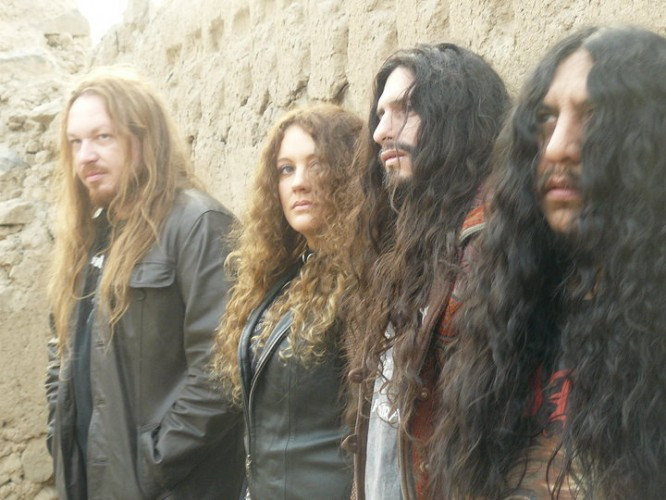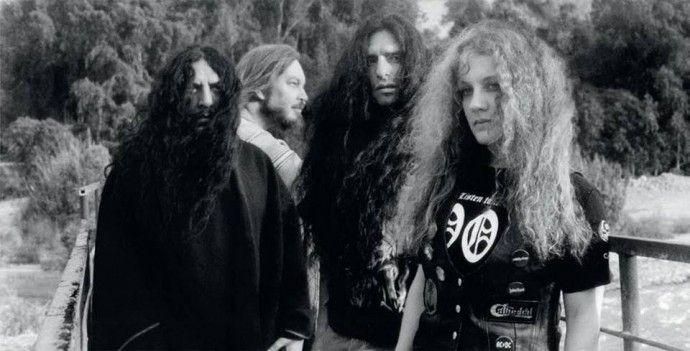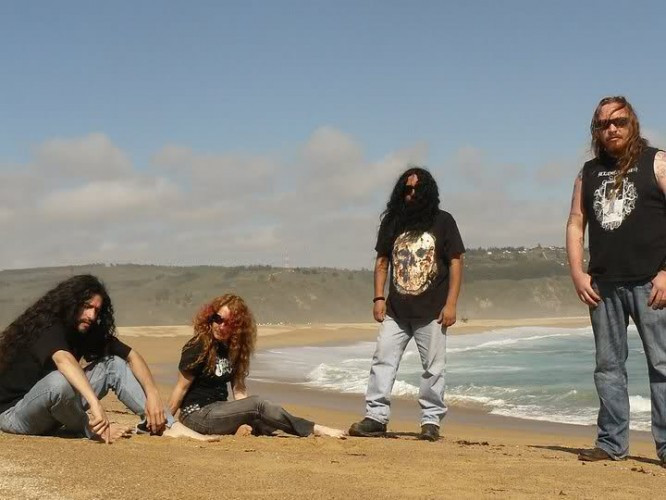
(Comrade Aleks returns with an interview of members of the Peruvian doom band Reino Ermitaño, whose latest album Aleks reviewed for us here.)
Reino Ermitaño are well-known as followers of the doom path. This Peruvian band was born about fourteen years ago and since then they’ve proved that they have good taste and know how to play solid and nontrivial doom metal. Their mix of traditional doom and traditional elements of their native culture make a good balance, and the vocals of Tania Duarte are one of band’s features along with hypnotic, driving riffs and highly skilled guitar solos.
Reino Ermitaño finished their 5th full-length record Conjuros de Poder in Autumn 2014 and brought the power of their spells to Europe in a brief tour right after that. It’s a band that always have something new to show, and its members always have something interesting to say. I got in touch with Marcos Coifman (bass) to do this interview, and Tania Duarte (vocals) and Julio Almeida (drums) joined our conversation, too.
Hail Marcos! How are you man? What’s new in the Reino Ermitaño camp?
Marcos: Hello, brother! We are currently coming out from a brief recess & recharging, after the release of our fifth album Conjuros de Poder and a much enjoyed tour in Europe and just about to get back into playing shows and putting together new material and get ready for whatever comes next.
Please tell us about this tour – how did it go? How many cities did you visit?
Marcos: The last tour was awesome… it went really well. We played three Doom festivals (Malta Doom Metal, Doom Over Vienna, and Hammer of Doom) and we got to share stages with old friends like Procession, awesome acts like Toner Low and Dread Sovereign, very cool bands we just got to know like Spain’s Misty Grey and Slovenia’s Mist, and lots of bands we have loved and worshiped for years like Saint Vitus, Trouble, Desolation Angels, Manilla Road, etc.
A really wonderful experience, we played gigs in Amsterdam, Vienna, Malta, Madrid, Budapest, and a bunch of different cities in Germany. Man, some of those shows are gonna’ be tattooed in my brain until I die… the gig with Trouble and Wall of Sleep in Hungary, all the awesome people and vibe in MDM, Hammer of Doom — all of it!, the DOV crew, the punky circuit at Leipzig, the last night of the tour at The Cave in AMS… it was all truly a great experience. Wish we could go to Europe more often.

Did this tour differ from previous ones? What kind of problems did you encounter and how did you solve them?
Marcos: Ah, with DIY it’s always a different story! To begin with, we didn´t have our own vehicle at all times on this one, so we had to mix it up between borrowed cars, friends driving, and a whole bunch of public transportation (which can be a rough one when hauling merch and gear through long distances and several connections, let me tell ya!), But, you know, you get a rich picture of the places you’re travelling through. We didn’t have much trouble, save for getting searched once and asked for papers a bunch of times, but those are occupational hassles, I suppose, and we weren’t carrying anything anyway.
Also, some months before our tour our drummer was in an accident; he’s a tour conductor and was working on an eco lodge in the Peruvian jungle, when a rural bridge he was crossing fell under him, causing him to plummet to the river and the rocks, breaking both bones in his forearm right by the wrist. So, we didn’t cancel our festival engagements (never!) because after a while, when his cast came off we learned that he was fit to play, but we couldn’t play many dates back to back because he was in too much pain for that, so we had to book lightly, mostly weekends and a day or two during the week.
By the very end of the period before the tour he was in better shape, but this couldn’t have been predicted and it was too late to take on more shows, so we had to take a hit with our expenses. Nevertheless, this was what we had to do, and we enjoyed the hell out of the shows we played. It seems the crowds had a good time as well. Some unexpected gigs happened too — a crowd from Spain came to the Malta fest and a couple of weeks later, flew us in to play a show in Madrid! That was a rad show and a very cool experience.
Indeed I would like to start with a question about your previous record Veneración del Fuego. I always wonder how you keep some national features in your music besides its traditional (Black Sabbath and so on) doom origins. How were these elements reflected in that album?
Marcos: In my particular case, when it comes to writing songs, I don’t intentionally seek out “native” influences like South American folk and such. It sometimes gets into the song naturally, and because we all dig that kind of sound, we just let it in.
Sometimes it stays within the format of heavy music and it’s subtle, like, perhaps if you are accustomed to listening to Andean folk you’ll get a glimpse of a rhythm or a riff here and there that comes from that… other times, like in Tania’s song “Sangre India” from Veneración del Fuego, the Andean thing takes a life of its own… it usually starts small, with a verse or a small part within the song, then we start adding native instruments ’cause the part just begs for it and it builds up from there… it also doesn´t hurt when the lyrics and the whole theme for the song revolve around a historical or Andean subject, such as in that one… it just make sense.
In all cases I think our process is rather soft and flowing about such things, many things are tried out and decided along the way of the song being created and arranged, and we usually all agree when it comes to “man, some pan flutes would go great over this riff”. Sometimes we try something that doesn’t work and we just scratch it and move on.
The new album Conjuros de Poder was released by the band itself. I believe that I Hate Records, who released Veneración del Fuego, could have supported you this time, too. Why did you hurry releasing the album?
Marcos: It was just a matter of timing. We finished mastering the album just a few months before our Euro tour and naturally we wanted to take it with us there. But it was impossible to fit it into I Hate’s release schedule on such short notice, so we released it through Ogro, our doom-mongering label here. I Hate is giving us a hand with some distro and we remain in good relations.
Reino Ermitaño “En Mi Mente”
How fast was your new work recorded? What kind of feelings, energy, and efforts did you put into the new songs? And how did you manage all organizational deals?
Marcos: I believe it took about a month to record and a bit over another month to mix and master. That’s not full-time work, mind you, we have to do the juggling act with our own different occupations. I think this record came out compact and varied ’cause we all had a wide input on very different songs… I think Eloy came up with some golden rocking material as usual and laid down some of his best guitar solo work yet, Tania reached into some new and distant mystical depths with “Kali” and the epic and somber “Stigma of Cain”… Ñaka’s nine-minute, one-riff Ayahuasca mantra has a will of it’s own and it builds momentum in a hypnotic way we hadn’t tried before… inspired stuff.
As for my own things, I went a bit dark and oppressive with new songs “Calendula” and “Circe”, each in their own way… one more despairing, the other more sinister, perhaps. I like to take long time for writing songs, let the riffs and bits and pieces stew and simmer and fall into place on their own over a while… these ones were brewed while travelling far from here, mostly at night and outdoors, at large settings. I think they caught some of the vibe of those moments, the wonder you can feel sometimes when you’re reminded of what’s out there. “Ancestral” came to be a longer while ago at some Inca ruins near Cusco city, after the sun set and humans left and the mountains took back their realm. So there’s a whole bunch of romantic stuff going on, strolling in awe under stars to deep tar pits within’ you, to healing in the spirit realm and a bunch of straight-out heavy rocking and taking your place with the damned, among other various things.
Organizational deals were DIY as usual, just us and emails.
Yes, you also have great heartfelt guitar solos besides these massive riffs, and it really makes your songs breathe with energy and retro magic; are all of these solos written by Eloy Arturo on this album?
Marcos: Yeah, Eloy always takes care of his solos, he really is a massive guitarist… he’s been around for a while, you know? He’s a founding member of the mythical Peruvian band Kranium, which has been going on since 1984… (if you wanna’ hear some of them, I recommend you begin with Testimonios, some heavy Peruvian folk metal there). He just rips, and I agree, his solos add immensely to the songs and the feelings they give you… second track “Ancestral” has one of my favorite ones.
I must admit that “Kali” song was a surprise for me — why did Tania turn to this Indian goddess? And the sitar arrangement sounds right at its place; it adds a necessary feeling of Indian ritualistic atmosphere. Hail Tania!
Tania: I’ve been reading some literature about Indian goddesses and their mantras and what they represent. I got Sarasvati tattooed on my arm first as a representation of my love for the arts, music, and literature. Later, Kali caught my attention as a goddess of boldness and fierceness in the feminine, and also the one who guides you through killing your worst egos and cleaning your karmic path. So I found it to be the best antithesis and complement of Sarasvati and got it on my other arm. I’m all for feminine empowerment and the meaningful symbolism of these goddesses. Kali gives me strength.
Eloy is a wonderful string musician, also into Hindu music and spiritualism. He owns and plays the sitar and other ancient instruments. I had the melody and sang it a capella and he introduced the strings, and later, the percussions. It came out mystical and oriental. I wanted something short but meaningful, kind of like a mantra song.

What’s the “Calendula” song about? I know that calendula is a medicinal herb, but I didn’t know that it also grows in South America.
Marcos: If I had to somehow explain “Calendula”’s lyrics, I’d say they’re are about finding your path through abandon and surrender to the nocturnal that carries your name since you were a kid. The name “Calendula” came as the song was taking form, not out of a direct relation with the lyrics, but with the music and the general feel of the melodies.
Marcos, once again you’ve done an art-work for a Reino Ermitaño album. How did you work out this one? And where else can we see your works?
Marcos: The process was similar. Once we had the music recorded and at a decent mixing stage, I played it on a loop while drawing rough ideas… once I settled on something I liked, I ran it by the band, we talked about the way it should go, and then I set to painting it. This time the style ended up a bit more influenced by my non-illustration, regular work, I think… just a bit more abstract-flirtateous, more loose on the strokes and all that.
There are some paintings up in the portfolio tab in my website: www.marcoscoifman.com
I remember that you and Tania said in our past interview about your participation in ayahuasca rituals. Did you take part in it again since then?
Tania: I have been participating in ayahuasca rituals for a while, which means intense inner work, healing at different levels, cleansing, changing, and realizing things about my own life.
I know that taking this sacred drink needs long preparation with both mind and body cleansing. Did you practice it too?
Tania: There is a kind of fast on certain foods and toxins to be respected before and after the ritual. The mind needs to be clean of mental toxins as well. Meditation surely helps.
Reino Ermitaño “Calendula”
How was your experience reflected in your new songs?
Tania: I believe the visions and ideas you receive during these trances plus the changes you undergo at a personal level are definitely manifested in your art, lyrics, and music. In my case, I have reconnected with what was always my calling: the protection of nature and ancient cultures’ wisdom. The acceptance of a dark, animal side or shadow within, that is a rich part of our spiritual self that people are most generally trying to hide or disguise, with terrible consequences to society. I’ve become more politically aware, empathetic with social causes, than I was in the past. A new sense of creativity and new universes have opened to me, and some ideas shine with clarity and have now a solid shape.
Julio: The song “En mi Mente” from the record Conjuros de Poder, I wouldn´t say was “composed”, but something that came to me, during an ayahuasca ritual. The melody presented itself as a constant riff, without changes, a heavy mantra that deserved to be a song. In that moment everything was pure and spiritual. I kept it gratefully in my mind and days later wrote the lyrics.
Yes, “En mi Mente”… I did want to ask about it anyway. What are your other new songs about?
Tania: Banishing hate and living with it, sorting out obstacles, the dual Goddess and feminine energy, having the stigma of which Hesse talks about in Demian: the outcast’s stigma you are born with that hinders you from understanding ants and other insects.
Marcos: The dissolution of self into greater currents of being, surrendering consciousness to vast, powerful, and resilient forces, and the communion with deep, dark, and ruinous magic that bleeds from ancient deities which are of your same making and that call from within.
I think that Reino Ermitaño consequentially moves from album to album without extreme changes. Do you have something principally new this time?
Julio: Not necessarily, although it is true that we have a defined style of doom, and that we incorporate native instrumentation in our albums, giving a folk touch to some of our songs, our records always have a different feeling. One is darker or the other heavier, but there are always things that are different to what we commonly make, as is the case in “Abraxas” from the new record.
What are the necessary components of your music?
Tania: Heaviness, personal truthfulness, feelings, ideology, poetry, darkness, moving riffs, social protest, melancholy, contrast.
Marcos: There’s a certain thing that I can’t quite put into words, but has become part of the language of this band. A dark vibe, between positive and negative. That. Non-verbal concept. Heaviness too, of course, and the path of the genuine riff… influences are good and well and welcome, but you gotta find your own way in, gotta latch on to that emotion and try to mirror it, materialize what you want to hear. To reach catharsis. That, too.
Much thanks!
https://www.facebook.com/pages/Reino-Ermitaño/229687576031
http://ihate.bandcamp.com/album/veneraci-n-del-fuego

awesome interview, Reino Ermitano is pretty killer 🙂
Great interview and great band! Cheers!